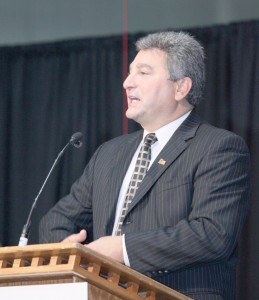The United Auto Workers Union is welcome to try to organize Toyota’s U.S. assembly and component plants, a senior corporate executive said – if the UAW can convince those workers there’d be a benefit to the deal.
Steve St. Angelo, Toyota’s North American chief quality officer, reminded reporters after his presentation at the Management Briefing Seminars, in Traverse City, Michigan that the UAW has tried to organize its plants before but has so far been unsuccessful.
“It’s up to the team members,” St. Angelo said, as a top executive of the Japanese company that just shut its only UAW plant in California, its largest U.S. market.
Earlier in the conference new UAW President Bob King called on all automakers to follow a set of principles aimed at giving workers the freedom to choose a union. King said that his goal was to work as partners with the automakers and promised that if they agreed to work with the UAW, they would become stronger for it. But the new autoworkers chief added that the union would use every resource available to it to fight any automaker that denied workers’ rights.
St. Angelo said he doesn’t comprehend the union’s tactics.
“I still don’t understand why they are picketing our dealerships,” St. Angelo said, referring to a campaign the UAW has launched in California. The dealerships are independent from the company, the Toyota quality czar insisted – though that appears to be a part of the union’s strategy.
St. Angelo said that the company has never laid off workers and even decided against layoffs during the Great Recession of 2008-09, as well as when plants were shut down to fix problems related to unintended acceleration recalls.
But a reporter challenged him on that point, asking about the workers who were let go when the company decided to close the New United Motor Manufacturing, Inc. (NUMMI) in Fremont, California. Originally operated as part of a joint venture with General Motors, Toyota assumed complete control after GM’s 2009 bankruptcy. The plant, the only one Toyota has walked away from in North America was also, coincidentally, the only unionized factory it operates in the U.S.
St. Angelo said the company provided seven months of work to the employees as the plant closed, as well as a $250 million severance package.
“We treated the NUMMI team members a lot better than our partner (GM),” St. Angelo said.
The closure of NUMMI has generated a lot of negative headlines, notably in California, a state where Toyota has traditionally enjoyed a high market share. Hoping to find a way to minimize the impact of the closure, Toyota recently agreed to sell the assembly plant to Tesla Motors, the California electric vehicle start-up, with which the Japanese automaker now plans to partner on the development of future battery vehicles.
Toyota isn’t the only foreign-based automaker the UAW has failed to crack. In fact it has lost every organization vote so far at the transplants, winning representation rights only at a handful of factories that are or were originally set up as joint ventures with Detroit’s Big Three, including the Mazda/Ford facility in Flat Rock, Michigan and the Mitsubishi plant — originally launched as a partnership with Chrysler — in Bloomington, Illinois.

